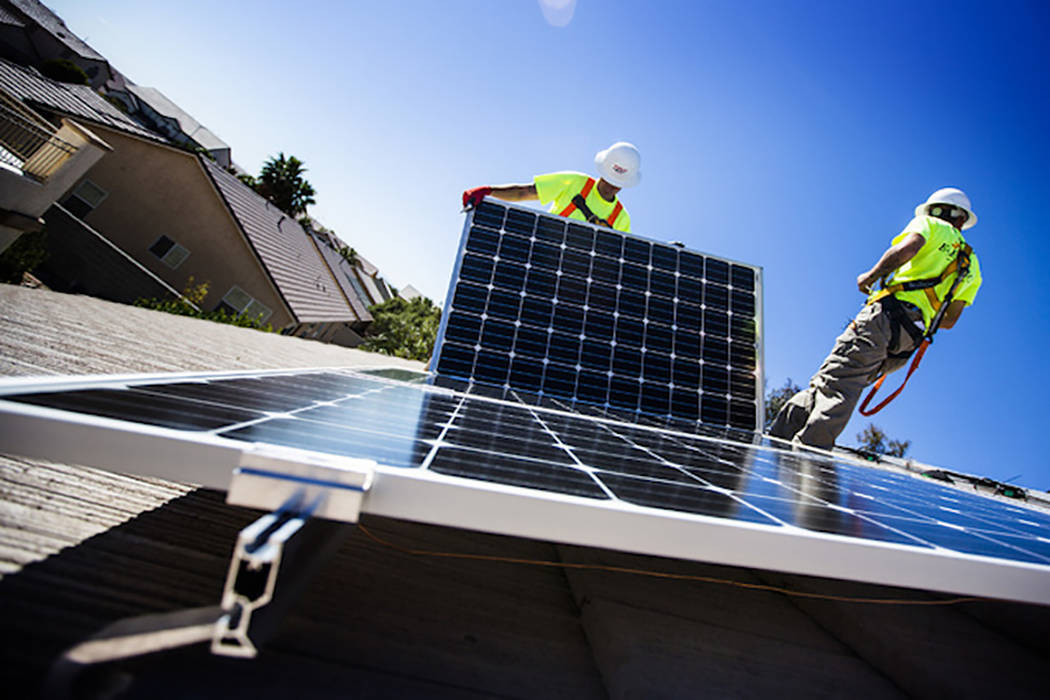Solar bill would have hefty price tag in Nevada
CARSON CITY — A bill seeking to resurrect Nevada’s rooftop solar industry would create new costs of more than $48 million a year over the 20-year life of the measure, an NV Energy analysis shows.
Just over $30 million a year on average would result from credits paid for energy generated from the systems that would be above market value.
Another $18.2 million would result from providing the cost of services to Nevada net metering customers below the actual cost of the service, the document provided to the Senate Commerce Committee says.
When the obligation from the 25,0000 current net metering customers is included, the annual cost of the homeowner-based rooftop solar program would average $63.3 million a year or $1.3 billion over the 20 year life of Assembly Bill 405, the document says.
“Assembly Bill 405 does not address who will be responsible for these costs or administer the private solar generation program if the Energy Choice Initiative passes in November of 2018,” the document says.
Question 3, an amendment to the state constitution that would open Nevada’s energy market to competition, passed overwhelmingly in 2016. If it passes again in 2018, lawmakers would adopt rules to allow consumers to shop for and purchase their energy from competing providers.
AB405 passed the Assembly on Wednesday on a 38-2 vote. It was heard by the Senate panel on Wednesday but no immediate action was taken on the measure.
NV Energy is neutral on the bill.
Reimbursement rates
The bill would reimburse rooftop solar owners at 95 percent of the retail rate of the generated electricity, which is 11.3 cents per kilowatt hour in NV Energy’s Southern Nevada region. The average Southern Nevada residential customer uses 1,141 kilowatts of electricity a month.
The 95 percent reimbursement rate would be available for the first 250 megawatts of rooftop solar generation. The reimbursement rate would be reduced to 90 percent for the next 160 megawatts, dropping to an 80 percent rate when rooftop solar energy totals 10 percent of the peak power grid production.
The reimbursement rates would be maintained for 20 years under the rate when the homeowner installed a system. This is intended to give stability to homeowners who will spend $20,000 or more to install a rooftop system.
The NV Energy calculation of costs assumes the 10 percent target is reached with the step downs.
Solar outage
Nevada’s rooftop solar industry ground to a halt after the state Public Utilities Commission adopted a new rate class for net metering customers that is gradually lowering the credit for excess electricity generated by the systems. The new rates took effect in 2016.
Rooftop solar companies, customers and green energy supporters are backing AB405 to bring the industry back to Nevada. Many testified in support of the bill at the Senate hearing.
But concerns remain about the reimbursement rate set in the bill because the costs would be borne to all ratepayers.
The effects of Question 3 are also a concern for some policy makers.
Gov. Brian Sandoval said he supports net metering, but he also expressed concerns about what would happen with net metering customers if they will have to sign up with a new energy provider if Question 3 passes.
“Who makes up that difference,” Sandoval said when asked about the bill on Wednesday. “I just want to make sure the people who have installed that rooftop solar are protected.”
Contact Sean Whaley at swhaley@reviewjournal.com or 775-461-3820. Follow @seanw801 on Twitter.
Cost associated with Nevada Assembly Bill 405 by Las Vegas Review-Journal on Scribd
A bill seeking to resurrect Nevada's rooftop solar industry would create new costs of more than $48 million a year over the 20-year life of the measure, an NV Energy analysis shows.






















